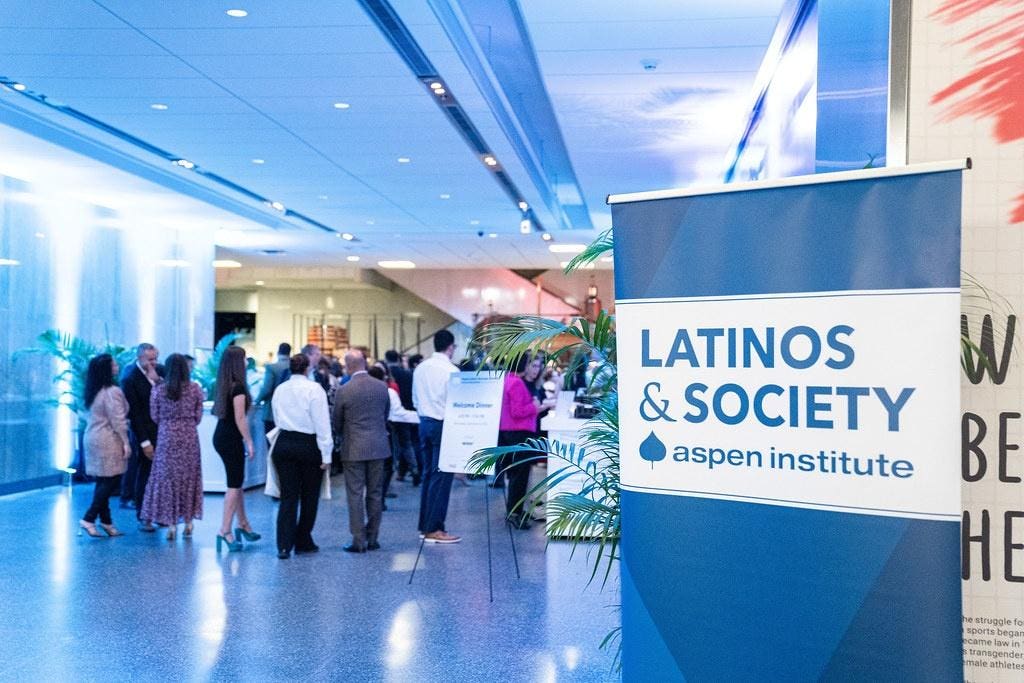By: Rhett Buttle
Last month, leaders from around the country gathered in Washington, DC, for the third annual Aspen Latino Business Summit. The summit is hosted by the Aspen Institute Latinos and Society Program, and brings local leadership, national networks, policymakers, and influential investors together.
Don Graves, Deputy Secretary of the US Department of Commerce set the stage by saying, “We are entering a new economy.” This is partly because we are seeing once-in-a-generation government investments in infrastructure, semiconductors, and green technologies – together with post-pandemic near-shoring and business trends in artificial intelligence (AI) – are changing our economy forever, and fast. It is clear that Latino entrepreneurs are in a position to help make this change a reality.
I was fortunate to attend this year’s summit, and came away feeling excited about the fact that what’s good for Latino business is good for the entire country. Here are five key takeaways from small business owners.
1. Latinos are poised to be the next drivers of the new economy
Latinos are shaping the economy of tomorrow. Since 1980, the U.S. Latino population has more than quadrupled, and now totals over 62 million, which is 19% of the country. With a median age that has risen to 30, Latinos are driving labor force growth and produce $3.2 trillion towards the nation’s GDP. If counted apart, this chunk would be equivalent to the fifth largest national GDP in the world. Every year, 2.4 million Latinos are graduating from four-year colleges, and by 2030, one in every five workers will be Hispanic.
2. Latinos still face unique challenges to economic prosperity
The typical Latina worker makes only $0.54 to every dollar their white counterparts make and Latino-owned businesses are 60% less likely to get a bank loan from major banks. While 19% of all Latino-owned startups are in the tech industry, which is higher than 14% of white-owned startups, only 2% of venture capital funds go to Latino-owned startups. Many of these business owners also have very little or no generational wealth. In 2019, about one third of the Latino population in the U.S. was made up of people who were not born in America. For many families, this means that the current producers are generating capital for the first time, with no generational wealth to provide security. So when a family member creates a business and is successful, they may be providing for older family members as well as their own children.
3. Business ownership is a pathway to prosperity for Latino households
Studies have shown that Latinos are nine times more likely to build wealth if they own their own business. In particular, Latina-owned businesses are the fastest growing, by number. At the summit, Small Business Administration (SBA) Administrator Isabella Casillas Guzman, spoke about how she helps small businesses across the U.S. thrive by increasing access to capital, contracts, and connections. Administrator Guzman grew up working alongside her father at veterinary clinics in Southern California, where she saw first-hand the dedication and craft it takes to operate a small business, as well as a deep appreciation for their importance in communities. Encouraging entrepreneurship among Latinos is critical, and public agencies like the SBA foster economic growth and innovation through supporting and advocating for people at all stages of their professional journeys. This was a refreshing example of successful public-private partnerships.
4: To be part of the next economy, Latinos need to be prepared; their careers should be “future-proof”
As industry changes and the future of work evolves, it’s important that Latinos cultivate skills that will open doors to high-wage jobs. Frankie Miranda, President of the Hispanic Federation, advised young professionals to take their passions and merge them with technology. Miranda stresses that the AI revolution will impact Black and Brown folks most, and gaining skills in tech is the way to make sure Latinos aren’t left behind. This preparation not only presents the opportunity to address historical disparities in access to high-wage jobs but also the chance to get more diverse voices to the tables where generative technology is being developed. Without these voices, Miranda noted, we run the risk of creating AI with inherent bias. Diego Deleersnyder, Associate Director of Aspen Latinos and Society said, “If the Latino workforce doesn’t have the tools they need in order to succeed in the digital economy, this is going to negatively impact the competitiveness of the U.S. economy, as a whole.”
5: Latinos are not a monolith – and that is a strength
Mexicans, Puerto Ricans, Salvadorans, Dominicans, Cubans, Guatemalans, Colombians, Hondurans, Spaniards, and Ecuadorians are the 10 largest origin groups of Latino Americans. Within each of these communities, countless cultural and religious identities further expand the massive breadth of Latino diversity. Recognizing and valuing the cultural and linguistic diversity within the Latino community is key. Research shows that having diverse teams drives higher financial returns. Reboot Representation is an organization with a goal to double the number of Black, Latina, and Native American women receiving computer science degrees in the U.S. and help them secure good jobs in the tech industry. The ultimate goal is to get more Latinas in the board room. Reboot Representation reports that companies with above average diversity out-performed competitors by 19% in terms of innovation revenues.
An era of profound change and innovation is already here, and it is key that Latino communities be well-prepared to thrive in next-generation sectors to continue growing wealth and cultivating robust, resilient communities. This year’s summit looked at how to accelerate this inclusive growth.
Read the full article here





